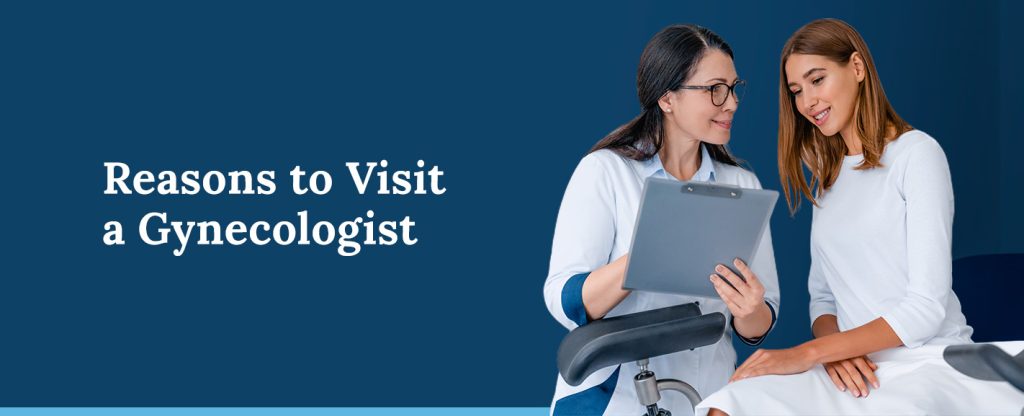
Reasons to Visit a Gynecologist
It is important for anyone who has a uterus to see a gynecologist or obstetrician-gynecologist (OBGYN) at regular intervals throughout their life. Whether or not you plan on having children, gynecologists and OB/GYNs provide essential women’s health services. In what follows, we will answer the question “What is an OBGYN?” and give reasons why it is important to visit a gynecologist.
What Is an OBGYN?
 A gynecologist or OB/GYN is a doctor that specializes in women’s reproductive health. While not all gynecologists are OB/GYNs, all OB/GYNs are gynecologists. As such, OBGYNs are expertly trained and experienced to provide pregnancy, labor, delivery and postpartum care in addition to general care for the female reproductive system. Their expertise includes delivering new babies and routine screenings like pap smears.
A gynecologist or OB/GYN is a doctor that specializes in women’s reproductive health. While not all gynecologists are OB/GYNs, all OB/GYNs are gynecologists. As such, OBGYNs are expertly trained and experienced to provide pregnancy, labor, delivery and postpartum care in addition to general care for the female reproductive system. Their expertise includes delivering new babies and routine screenings like pap smears.
What Can Gynecologists Do for You?
A gynecologist can support and advise you on a number of things including:
- Help you to understand the way your reproductive system works.
- Teach you what a normal vaginal discharge should be and how to tell if there’s a problem.
- Teach you what to do to protect yourself when you have sex.
Schedule an Appointment Today!
7 Reasons to Visit a Gynecologist
If you’re unsure if you should see a gynecologist or are wondering how you can find an affordable OBGYN clinic in your area, consider these seven reasons why visiting a gynecologist is beneficial:
1. To Test for STDs
Sexually transmitted diseases (STDs) are caused by different types of viral or bacterial infections that germinate and grow in the infected person’s genitals. Consequently, you can acquire or pass on STDs through sexual intercourse or by putting your hand, mouth or genitals on an infected person’s semen, vaginal fluid, blood or genitals. Your gynecologist can test for STDs through blood samples, urine samples or tissue swabs. Common STD symptoms include itching, pain, abnormal or smelly discharge or sores.
2. To Find Out If You Are Pregnant
If you’ve been sexually active and your period has suddenly stopped, you should go to your OBGYN. Additionally, if you suspect you are pregnant or have a positive at-home test result, it’s a good idea to visit your OBGYN quickly.
3. To Learn About Birth Control and Fertility
Once you become sexually active, you should take steps to prevent unwanted pregnancies. Your gynecologist will be happy to discuss your options with you. They’ll show you various birth control techniques and show you how to use them properly.
Additionally, they can offer guidance on your menstrual cycle and ovulation in the event you and your partner want to get pregnant.
4. To Discuss Menstrual Problems
If you notice that your menstrual cycle has suddenly become irregular, if you bleed for a long time, or some months pass without seeing your period, you need to visit your gynecologist immediately. Ignoring such symptoms may lead to serious reproductive issues in the future.
5. To Have a Breast Exam
Gynecologists can help you conduct a thorough breast exam to check for lumps, which can be an indication of cancer. Breast exams are particularly important when you’re over 40, but you may need to do them more often if you have a history of breast cancer cases in your family.
6. To Get a Pap Smear and Pelvic Exam
It’s quite important to get a pelvic exam if you’re at the age of 21 or older. Pelvic exams are particularly necessary when you have pelvic pain, delayed childbearing, strange vaginal discharge and menstrual disorders. During a pap smear, your doctor takes samples from your cervix to test for any abnormalities or viruses. Going for a pap smear can help you reduce the risk of cancer and many other health problems.
7. For Checkups After Sex
Should you visit your OBGYN after every time you have sexual intercourse? No. But you should visit your gynecologist for sexually related issues, especially when you notice that sex is very painful, you miss your period after sex or you discover strange symptoms on your genitals. Most sexually related problems can be treated effectively when you respond quickly.
Schedule an Appointment Today!
Frequent Questions About Visiting a Gynecologist
The following are some frequent questions many people have about visiting the gynecologist:
Can You See a Gynecologist On Your Period?
You can still see a gynecologist when you are on your period. However, your gynecologist may recommend rescheduling if you have a pap smear or pelvic exam scheduled while you are on your period, particularly if you are bleeding heavily, as blood can impact the lab test results.
At the same time, you can certainly see your OB/GYN while you are on your period for any other gynecological question or concern you have. You should especially make an appointment with your gynecologist if you are experiencing period-related issues during your menstrual cycle.
How Often Do You Need a Gynecological Exam?
The experts are not unanimous on how often you need a gynecological exam. The American College of Physicians (ACP) suggests that women aged 21 and older who are neither pregnant nor at risk of pelvic disease have a pelvic exam every three years. In contrast, some doctors may recommend an annual pelvic exam for women over 21 years old, especially if certain risk factors are present.
Women between the ages of 21 and 65 should have cervical cancer screening with a pap smear every three to five years. After you reach the age of 65, your risk for cervical cancer decreases.
Do I Need to Prepare Before Seeing an OBGYN?
For a routine OBGYN appointment, there is not much you need to prepare. It may be helpful to compile a list of questions or concerns you want to address with your OBGYN so you can make the most of your appointment. Also, be sure the office has your medical records and any insurance information to streamline your visit.
Some things, however, you may want to hold off on, including:
- Bikini waxing
- Douching
- Intercourse the night before your exam
Your provider can give you more specific information about preparing for other appointments, such as a pap smear, ultrasound or other procedure.
At What Age Should a Girl First See an OBGYN?
Your first gynecologist appointment should be between 13 and 15 years old. While it is normal to feel nervous about your first OBGYN appointment, it will most likely involve a discussion between you and your doctor. Topics of discussion may include:
- Your general health
- Your family’s medical history
- Your menstrual cycle
- Guidance on safe sex practices
Let your doctor know if you would like the discussion to remain confidential. In addition to this discussion, your doctor may also perform a general physical exam to check your overall health. They may also conduct an external genital exam, which consists of a visual examination of the vulva.
Come to Hamilton Healthcare for Gynecological Care!
We proudly offer specialized services to care for all women’s reproductive and family health issues at Hamilton Healthcare! Our services include annual exams, birth control prescriptions, prevention of STDs and family planning services. We invite you to call us at (717) 232-9971 to book an appointment with our gynecologist today.
Schedule an Appointment Today!


